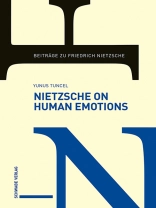Much has been said on particular feelings that appear in Nietzsche’s works, such as pity, revenge, altruism, guilt, shame, and ressentiment. But there has not been a significant study on Nietzsche’s overall teachings on feeling and emotion. What does Nietzsche mean by feeling and the related phenomena? Out of such disparate types of feelings and disparate reflections by Nietzsche on them, can one make sense or can one speak of a theory of feelings in Nietzsche? If so, how does this theory fit with his philosophy of value? On the other hand, how do his teachings relate to some of the later concepts of his philosophy such as the overhuman, the will to power and the eternal return of the same? While the book will contextualize Nietzsche’s emotive theory in relation to other emotive theories in the history of ideas, it will also explore Nietzsche’s influence on later generations in this area.
‘Although Nietzsche is a brilliant and original philosopher of the emotions and passions there has been to date no concerted attempt to present and examine him as such. This admirable study by Yunus Tuncel goes a long way towards meeting this need and is essential reading for all scholars and readers of Nietzsche.’ Keith Ansell-Pearson, Emeritus Professor of Philosophy, University of Warwick
‘It’s remarkable there hasn’t been a good book on Nietzsche and the emotions – until this remarkable work by Yunus Tuncel. His insightful discussions range from ressentiment and Schadenfreude to a crucial emotion in these sad times: the feeling of power.’ Graham Parkes, University of Vienna
Sobre el autor
Yunus Tuncel, Associate Teaching Professor at The New School (New York), is a co-founder of the Nietzsche Circle and the Editor-in-Chief of its electronic journal, The Agonist. He is the author of Complete Fragments, Towards a Genealogy of Spectacle, Agon in Nietzsche, and Emotion in Sports, and the editor of Nietzsche and Transhumanism.












